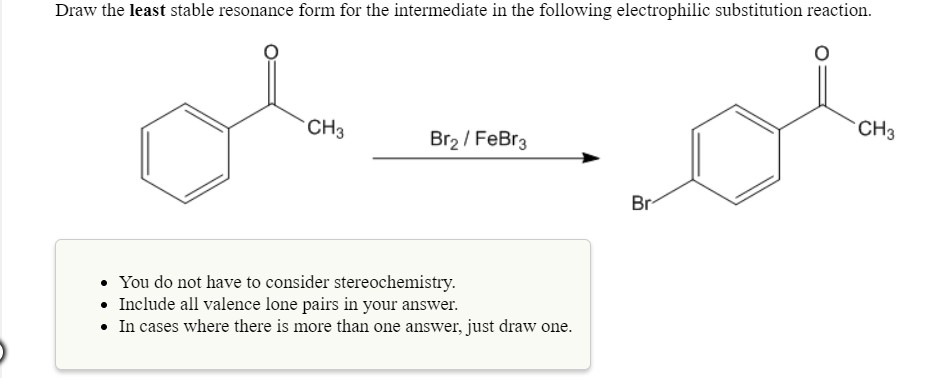Draw the least stable resonance form for the intermediate in the following electrophilic substitution reaction. CH3 CH3 Br2/ FeBr3 Br . You do not have to consider stereochemistry . Include all valence lone pairs in your answer. In cases where there is more than one answer, just draw one.
Draw the least stable resonance form for the intermediate in the following electrophilic substitution reaction. CH3 CH3 Br2/ FeBr3 Br . You do not have to consider stereochemistry . Include all valence lone pairs in your answer. In cases where there is more than one answer, just draw one.
Organic Chemistry: A Guided Inquiry
2nd Edition
ISBN:9780618974122
Author:Andrei Straumanis
Publisher:Andrei Straumanis
Chapter13: Substitution
Section: Chapter Questions
Problem 2E
Related questions
Question
Draw the least stable resonance form for the intermediate in the following electrophilic substitution reaction.

Transcribed Image Text:Draw the least stable resonance form for the intermediate in the following electrophilic substitution reaction.
CH3
CH3
Br2/ FeBr3
Br
. You do not have to consider stereochemistry
. Include all valence lone pairs in your answer.
In cases where there is more than one answer, just draw one.
Expert Solution
This question has been solved!
Explore an expertly crafted, step-by-step solution for a thorough understanding of key concepts.
This is a popular solution!
Trending now
This is a popular solution!
Step by step
Solved in 2 steps with 1 images

Knowledge Booster
Learn more about
Need a deep-dive on the concept behind this application? Look no further. Learn more about this topic, chemistry and related others by exploring similar questions and additional content below.Recommended textbooks for you

Organic Chemistry: A Guided Inquiry
Chemistry
ISBN:
9780618974122
Author:
Andrei Straumanis
Publisher:
Cengage Learning

Organic Chemistry: A Guided Inquiry
Chemistry
ISBN:
9780618974122
Author:
Andrei Straumanis
Publisher:
Cengage Learning